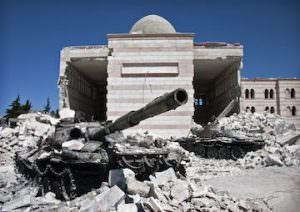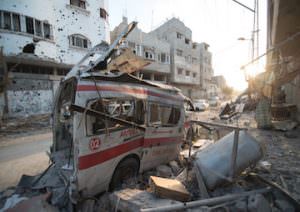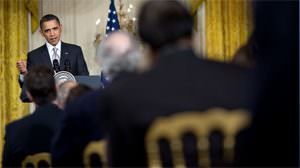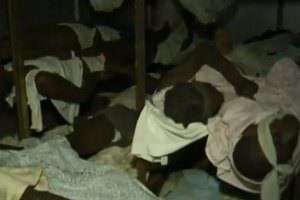Iraqi Renaissance?
The head of the Iraqi Red Crescent has a plan for Iraq, one that could test the theory that a few hundred million dollars spent on humanitarian aid would be more effective than a few hundred billion spent on bombs.WASHINGTON — You can call it a lull, a temporary truce, or a fragile beginning of possible rebirth. Renaissance is not a word easily applied to Iraq, where the government is incapable of providing basic services such as electricity and potable water; where a cholera epidemic is the latest killer; where many children have no schools to attend and their parents have no jobs; and where day-to-day living conditions are so dire that the government itself has told refugees not to return just yet.
Said Hakki, head of the Iraqi Red Crescent, the Muslim version of the Red Cross, does not call the uncertain atmosphere of reduced violence in Iraq anything more than a second chance. But, he says, “not many people get a second chance.”
He is making the rounds in Washington this week, giving interviews to the media, turning up in those congressional offices that will have him, presenting a plan — yet another plan — for building some semblance of civil society in Iraq, despite the twin plagues of continuing violence and political impasse. The second chance of which he speaks is faint. It is tainted, in some ways, by Hakki’s own frustrating experience in the health ministry under the Coalition Provision Authority, the American occupation government initially installed upon the ouster of Saddam Hussein and the root of so many mistakes — dismissing all Baathists from their civil service jobs is one that still slows civic revival — that haunt Iraq.
The past cannot easily be undone, Hakki knows. His chief concern is the future, particularly what it holds for about 2 million internally displaced Iraqis, people who have fled violence in their neighborhoods or been forced out through sectarian cleansing, as well as another 2 million or so who are living abroad and are beginning to trickle back home. “They live in abandoned buildings, or in the backyard of somebody, or in a mosque,” Hakki says.
The Red Crescent notes that nearly two-thirds of those internally displaced — that is, those who have left their neighborhoods but still live elsewhere in Iraq — are children under 12. Few attend school, either because they were forced to drop out or because what documents they have do not allow them to transfer easily to a new district. Many are malnourished. “Iraq is twice as rich as California, and yet we have malnutrition,” Hakki says.
In the exchange of recriminations that marks the battle between the White House and Congress over conditions for continued U.S. military involvement in Iraq, few dare utter words such as “Marshall Plan” for Iraq, let alone expend much breath discussing reconstruction. The American-led effort to rebuild Iraq thus far has itself been sullied by no-bid contracts, incompetence, jobs left unfinished and outright corruption.
Still, Hakki says, what Iraq needs now — if its people are to take any advantage of this quieter interlude — is civic reconstruction on a grand scale. He is proposing a half-billion-dollar project for Baghdad alone, which he hopes would be jointly funded by the U.S. and Iraqi governments, regional Arab governments, the United Nations and private aid groups.
The goal is to provide essential services to about a quarter of the displaced. A down payment of that size would allow for such basics as electric generators, the funds to turn an abandoned house into a school, a water treatment plant, a mobile clinic. It would resemble the Depression-era Work Projects Administration in the United States, because the displaced who return to their neighborhoods would be employed in the rebuilding. The idea is to improve living conditions sufficiently so that by the middle of 2008 — not coincidentally, in the midst of the American presidential campaign and a time frame often discussed as a target date for significant troop withdrawals — progress would be visible.
The American public already is sick of Iraq, weary not only of so many soldiers’ deaths but frustrated by the enormous expenditure — $565 billion and counting — for Iraq and Afghanistan war operations. The money was squandered on a military incursion that had no basis in a genuine threat to the United States, and on an occupation that provoked an insurgency and civil conflict.
The Iraqis are responsible for their own political incompetence, but not so much for the humanitarian crisis they face. Former Secretary of State Colin Powell famously warned that if we broke Iraq, we would own it. Especially for Democrats who want desperately to withdraw militarily, now is the time to consider leaving something in America’s wake other than a broken people.
Marie Cocco’s e-mail address is mariecocco(at)washpost.com.
© 2007, Washington Post Writers Group
Your support matters…Independent journalism is under threat and overshadowed by heavily funded mainstream media.
You can help level the playing field. Become a member.
Your tax-deductible contribution keeps us digging beneath the headlines to give you thought-provoking, investigative reporting and analysis that unearths what's really happening- without compromise.
Give today to support our courageous, independent journalists.






You need to be a supporter to comment.
There are currently no responses to this article.
Be the first to respond.